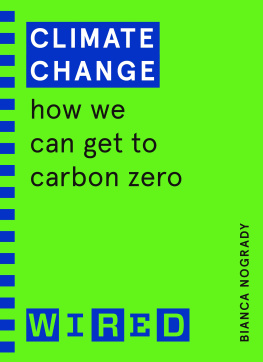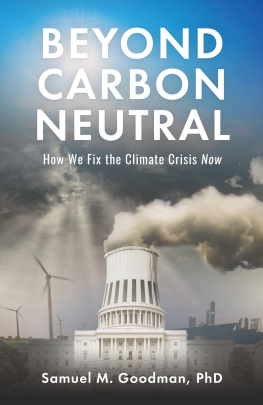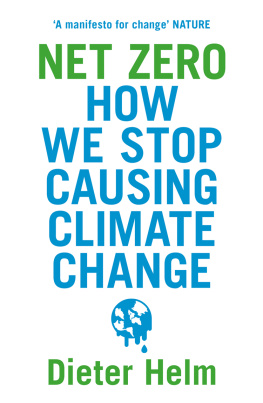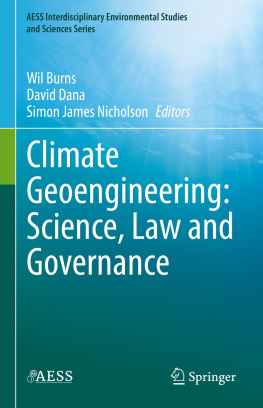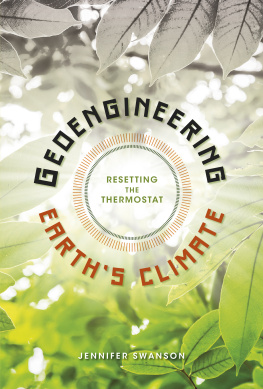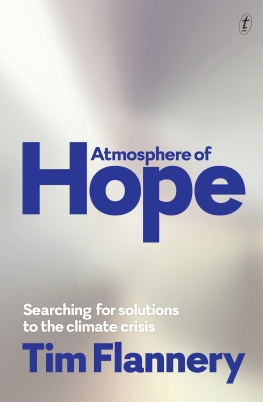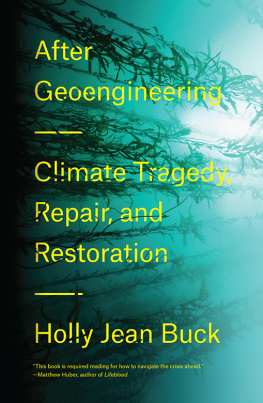Suck It Up
How capturing carbon from the air can help solve the climate crisis
By Marc Gunther
Contents
1 Introduction
This book may depress some people. It shouldnt. To the contrary, Id like to stimulate a conversation about new ways to think about global warming, the most daunting problem facing humanity. To start, we need to face a grim reality: Governments, businesses and environmentalists have failed miserably to deal with the threat of climate change.
This June will bring the 20th anniversary of the 1992 Earth Summit in Rio de Janeiro. There, officials negotiated a treaty its known as the United Nations Framework Convention on Climate Change in which they agreed to stabilize greenhouse gas concentrations in the atmosphere at a level that would prevent dangerous anthropogenic interference with the climate system. Some 192 countries, including the United States and China, ratified the convention. Since then, annual global emissions have grown by nearly 45%. Atmospheric concentrations of CO2 are rising steadily. The risks posed by climate change grow every day.
In the U.S., climate regulation appeared tantalizingly close just a few years ago. More than a dozen FORTUNE 500 companies, including GE, Ford, Shell and Duke Energy, joined with influential environmental groups to form the U.S. Climate Action Partnership to press Congress to enact strong national legislation to require significant reductions of greenhouse gas emissions. In 2008, presidential candidates Obama and McCain supported legislation to cap carbon emissions. But President Obama made the economy and health care his priorities, and the Republicans morphed into implacable opponents of climate regulation. A weak cap-and-trade bill barely cleared the U.S. House of Representatives and never came to a vote in the Senate.
Whats maddening about the lack of progress is that we know what to do about global warming or at least we think we do. Back in 2004, physicist Robert Socolow and ecologist Stephen Pacala, both of Princeton, wrote an influential paper in Science : They argued that energy efficiency, nuclear power, low-carbon fuels, avoided deforestation and other current technologies that they called climate wedges could be deployed right away to stabilize emissions.
Humanity, they wrote, already possesses the fundamental scientific, technical, and industrial know-how to solve the carbon and climate problem for the next half-century.
Since then, Socolow is among those who have been dismayed by the resistance to climate action.
I know no one who predicted that the climate change message would be rejected on a scale that it is now, he says. Scientists and environmentalists interested in getting climate taken seriously have failed beyond their wildest imaginations We are losing the argument with the general public, big time.
This is no accident. But the reasons climate regulation has failed are not widely understood. Yes, the recession made it hard for Congress to pass a costly scheme to regulate greenhouse gas emissions. Yes, fossil-fuel interests spent a fortune opposing cap-and-trade. Yes, partisan media like Fox News gave a platform to climate skeptics and yes, the mainstream press found it hard to sound an alarm about an invisible, sl0w-moving threat.
But the obstacles that stand in the way of a climate regulation are bigger than any of that.
One is the need for a global solution. Had Congress acted to put a price on carbon, as the European Union has, that would have been a good start but only a start. CO2 emitted anywhere spreads everywhere. To curb greenhouse gas emissions, Canada will have to stop extracting oil from the tar sands of Alberta. Brazil will have to decline to exploit rich oil deposits off its Atlantic Coast. China will have to stop building coal plants. Governments all over will have to support nuclear power plants, allow wind turbines to spoil some ocean views, and put solar arrays in beautiful desert places. Well all have to spend more money for energy, because its expensive to capture emissions from coal plants or build the batteries for electric cars.
A second fundamental obstacle is this: The costs of mitigating emissions will be felt immediately but the benefits essentially, reducing the risk of climate disasters wont be felt for years. Governments find it hard, for obvious reasons, to impose costs on people today to generate uncertain benefits in the future.
Finally, theres the thorny question of how rich and poor countries will share the costs of financing a transition to a low-carbon economy.
This is why climate change is the most difficult problem mankind has ever faced.
Climate change is the biggest collective-action problem, probably, in human history, says Scott Barrett, the Lenfest-Earth Institute Professor of Natural Resource Economics at Columbia University. It always was, in theory. Now, after 20 years of action, weve seen that it is in practice.
See what I mean about depressing?
And yet.
This book offers a way out. Thats why I wrote it. Ive been writing about the social and environmental impact of business for years. Ive seen how markets can solve big, complicated and seemingly insurmountable problems. Who could have anticipated the benefits generated by electricity, air travel or the Internet? Who could have predicted that globalization would lift hundreds of millions of people out of poverty in China and India? Markets work fast. Governments are sluggish.
Thats why we need to explore new approaches to global warming. One is geoengineering: Planetary-scale actions designed to counter the climate effects of greenhouse gas emissions.
In particular, we ought to take a close look at a set of emerging technologies that are designed to capture carbon dioxide from the air. Backers of these technologies, which are sometimes called direct air capture of CO2, say, with good reason, that they shouldnt be thought of as geoengineering. Theyre more akin to recycling.
Why, they ask, cant we find ways to capture and recycle CO2 the way we now collect and recycle newspapers or aluminum cans? Suck it up and then make it into something useful. As it happens, scientists already know how to pull CO2 out of the air. But the conventional wisdom holds that its costly and impractical to do so. In the pages ahead, youll meet some smart people including Bill Gates who are trying to prove the conventional wisdom wrong.
My first sustained exposure to geoengineering and air capture came in February, 2010, when I was invited to a private meeting of the trustees of the Environmental Defense Fund, one of Americas most respected environmental groups, at the Cavallo Point Lodge in Sausalito, CA. Steve Hamburg, EDFs chief scientist, brought together scientists, economists and policy experts to talk about what it might mean for scientists to invent the equivalent of a global thermostat. Part of my job is to bring new ideas and issues to the organization, Hamburg told me later. Even if they sound a little crazy at first.
One of the speakers that day was David Keith, a physicist who was then teaching at the University of Calgary and has since joined the faculty at Harvard. Keith is a brilliant scientist, an entrepreneur and a strong advocate of government-backed research into geoengineering. He has a way of disarming critics by acknowledging the obvious problems with the idea of deliberately manipulating the Earths climate.
Geoengineering, Keith said that day, is like chemotherapy. Its something nobody should like.
But, as his listeners immediately understood, we treat cancer patients with chemotherapy because its better than the alternative. Someday, Keith said, we may turn to geoengineering for the same reason: Like it or not, in the event of a climate emergency, geoengineering could be best option we have to head off a global catastrophe.
Next page


